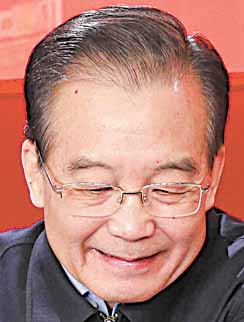China plans big economic change

ASSOCIATED PRESS
In this photo released by China's Xinhua news agency, Chinese Premier Wen Jiabao, left, prepares to hold an online chat with Internet users at two state news portals in Beijing, on Sunday Feb. 27, 2011.
Associated Press
BEIJING
China’s leadership is promising to steer the economy in a new direction in its blueprint for the next five years that would empower consumers and narrow a yawning wealth gap but require politically contentious reforms.
The latest Five-Year Plan — a throwback to central planning but a useful road map of party goals — calls for creating self-sustaining growth based on domestic consumption and reducing China’s reliance on exports and investment. That will require a cut in subsidies to state industries and curbs on local development plans that could provoke a backlash among some in the ruling Communist Party.
The leadership has said for years that China needs to alter a system Premier Wen Jiabao has declared “unbalanced, uncoordinated and unsustainable.” But they avoided major reforms until the global crisis wiped out millions of export-dependent factory jobs and drove home the danger of overreliance on trade.
The plan was approved by party leaders in October, and details are due to be announced at the annual meeting of China’s largely powerless legislature that opens Saturday.
If carried out, the plan could drive a far-reaching transformation of the world’s second-largest economy from low-cost factory into a major consumer market.
It would shift money from companies to households, which could narrow the gulf between a rich elite and fledgling middle class who have profited from economic reform and China’s poor majority. More consumer demand could help to boost imports, narrowing China’s trade surplus with the U.S. and other major economies.
The wide-ranging plan also extends to areas from foreign policy to family planning to rural irrigation. It promises more rural health-care spending and to help out-of-work farmers find jobs in cities — a step that could pay off by helping to promote growth of service industries and consumption.
It promises to allow development, though under government control, of civic groups that support causes from environmental protection to feeding the poor. It envisages no change in rules that limit most urban families to one child and most in the countryside to two.
In a sign of the leadership’s resolve, Premier Wen announced Sunday that the government was reducing its annual growth target to 7 percent, from the 8 percent goal for each of the past six years. Though the economy is certain to grow faster than that, the target has been embedded in planning for so long that a change would send a strong signal to local officials to shift away from breakneck growth and focus on longer-term policies to nurture consumption.
 43
43
